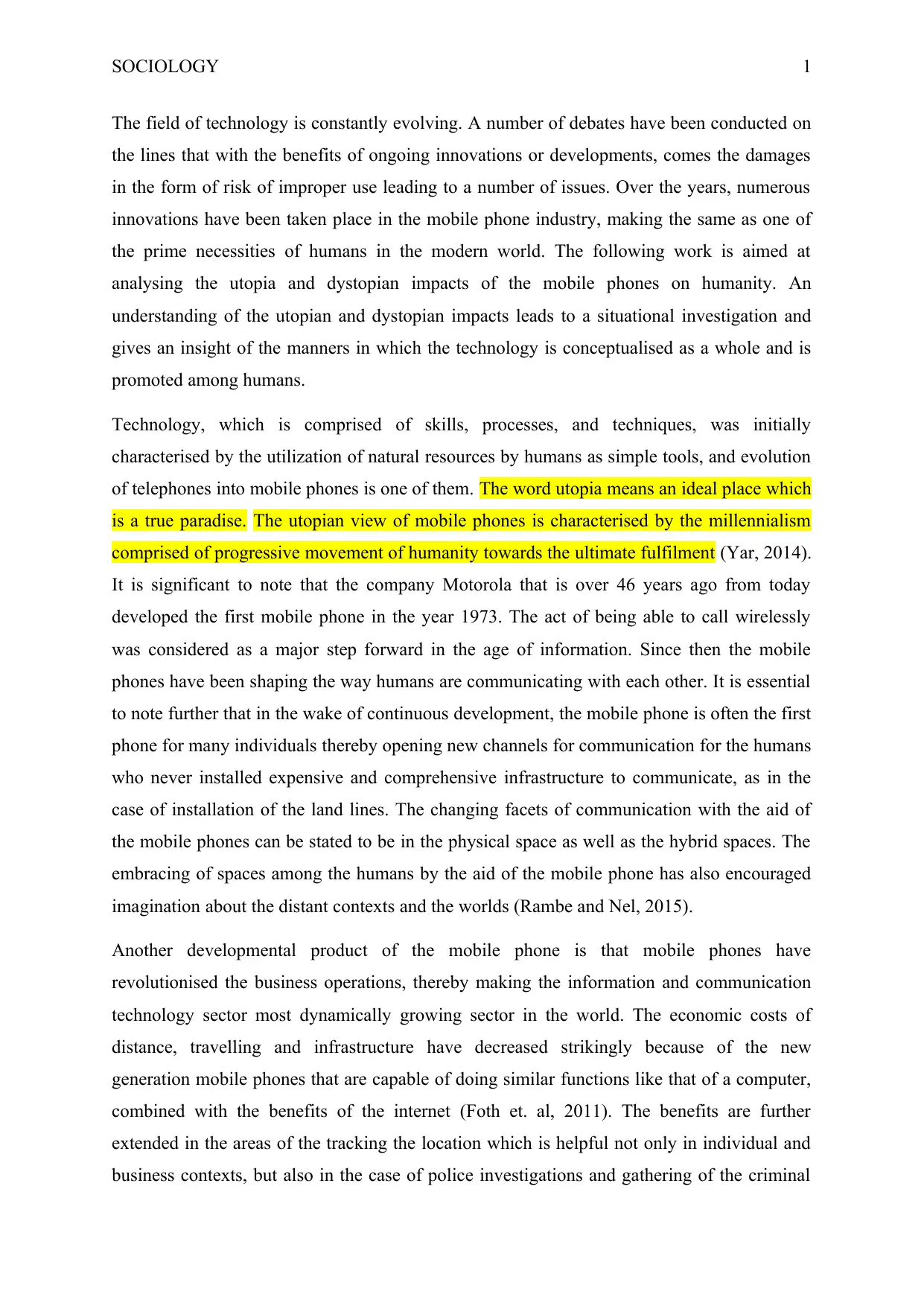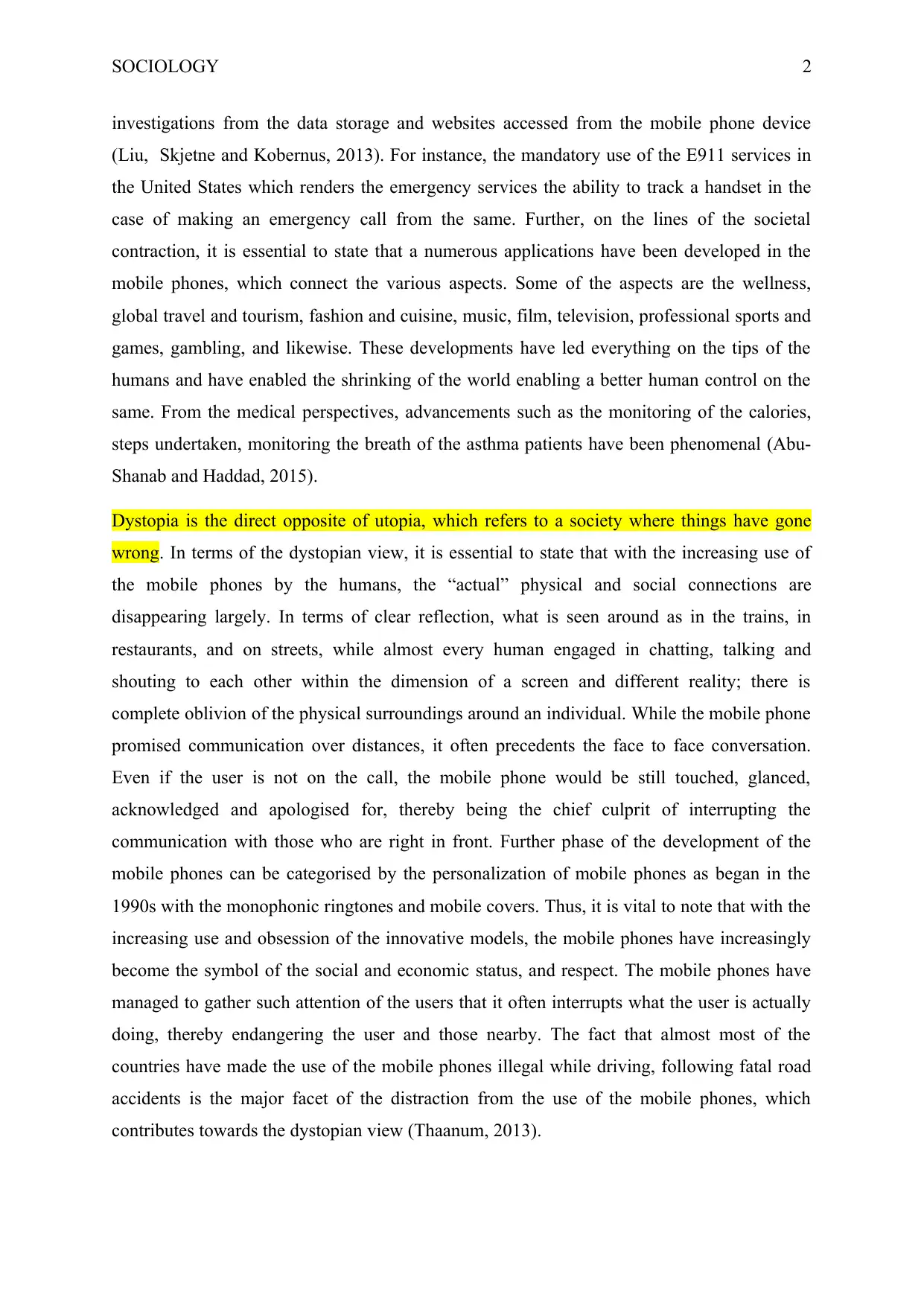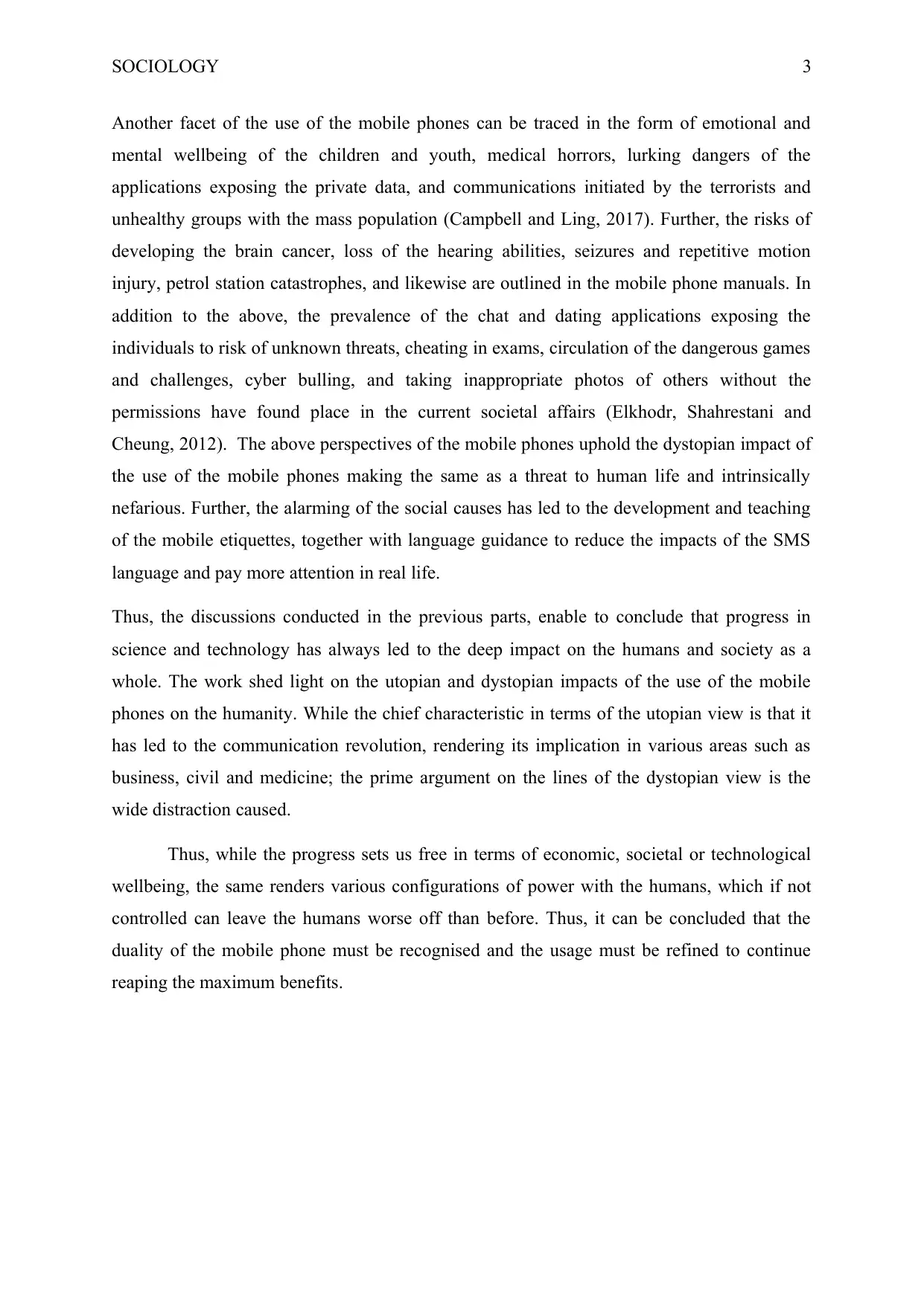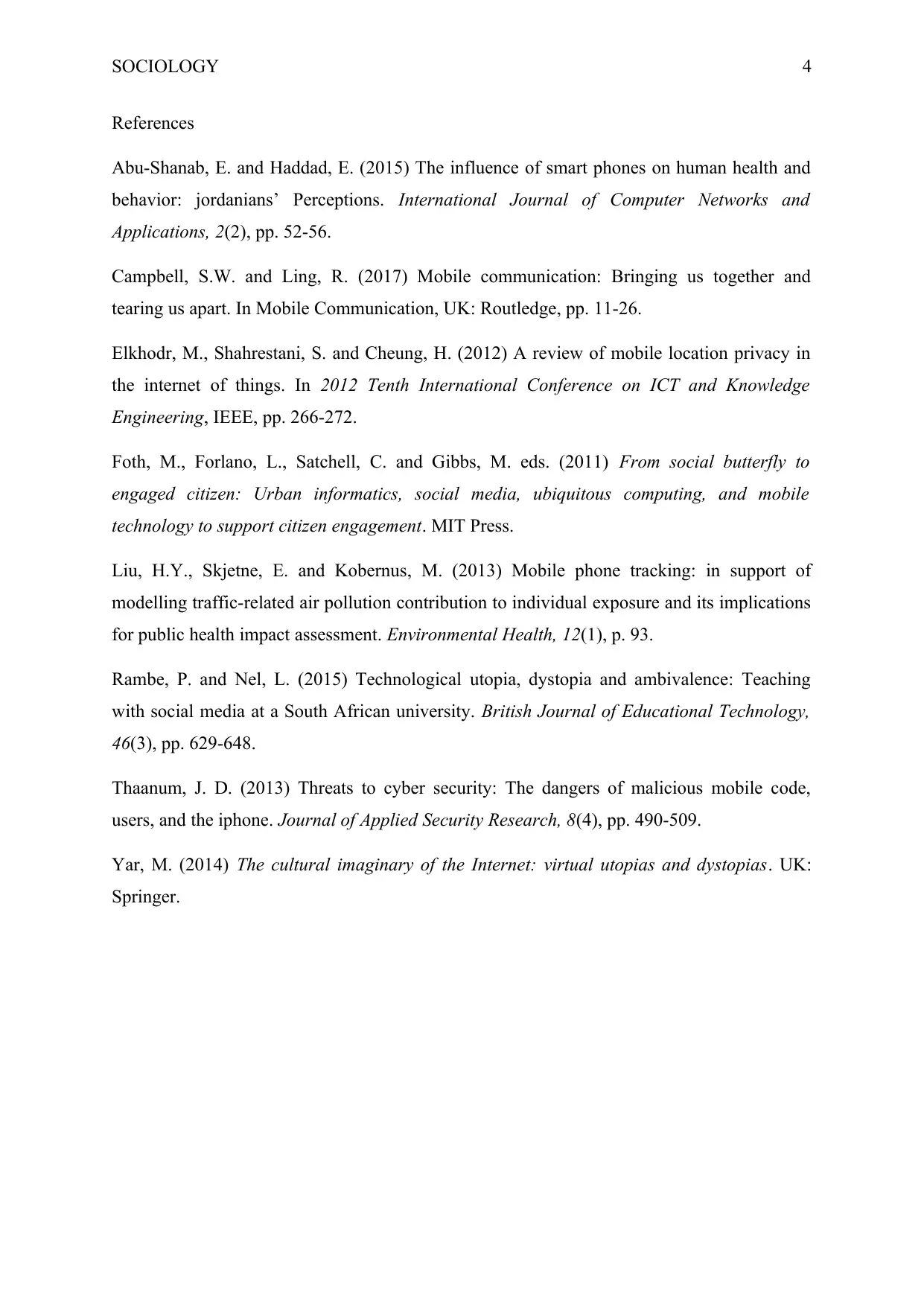KIT311/KIT611: A Sociological Analysis of Mobile Phones' Impacts
VerifiedAdded on 2023/04/07
|5
|1523
|418
Essay
AI Summary
This essay explores the utopian and dystopian impacts of mobile phones on humanity, referencing the Social and Cultural Issues of Interactive Digital Media (KIT311/KIT611) course. It begins by defining utopia and dystopia and then analyzes how mobile phones, from their inception, have revolutionized communication and business, offering benefits like location tracking and access to diverse applications. However, it also highlights the dystopian aspects, such as the decline of face-to-face interactions, distractions leading to accidents, and concerns about mental wellbeing, privacy risks, and cyberbullying. The essay concludes that while mobile phones offer significant progress, their duality must be recognized, and their usage refined to maximize benefits and mitigate potential harms. The assignment is available on Desklib, a platform offering study tools for students.

SOCIOLOGY
Social and cultural issues of interactive
Social and cultural issues of interactive
Paraphrase This Document
Need a fresh take? Get an instant paraphrase of this document with our AI Paraphraser

SOCIOLOGY 1
The field of technology is constantly evolving. A number of debates have been conducted on
the lines that with the benefits of ongoing innovations or developments, comes the damages
in the form of risk of improper use leading to a number of issues. Over the years, numerous
innovations have been taken place in the mobile phone industry, making the same as one of
the prime necessities of humans in the modern world. The following work is aimed at
analysing the utopia and dystopian impacts of the mobile phones on humanity. An
understanding of the utopian and dystopian impacts leads to a situational investigation and
gives an insight of the manners in which the technology is conceptualised as a whole and is
promoted among humans.
Technology, which is comprised of skills, processes, and techniques, was initially
characterised by the utilization of natural resources by humans as simple tools, and evolution
of telephones into mobile phones is one of them. The word utopia means an ideal place which
is a true paradise. The utopian view of mobile phones is characterised by the millennialism
comprised of progressive movement of humanity towards the ultimate fulfilment (Yar, 2014).
It is significant to note that the company Motorola that is over 46 years ago from today
developed the first mobile phone in the year 1973. The act of being able to call wirelessly
was considered as a major step forward in the age of information. Since then the mobile
phones have been shaping the way humans are communicating with each other. It is essential
to note further that in the wake of continuous development, the mobile phone is often the first
phone for many individuals thereby opening new channels for communication for the humans
who never installed expensive and comprehensive infrastructure to communicate, as in the
case of installation of the land lines. The changing facets of communication with the aid of
the mobile phones can be stated to be in the physical space as well as the hybrid spaces. The
embracing of spaces among the humans by the aid of the mobile phone has also encouraged
imagination about the distant contexts and the worlds (Rambe and Nel, 2015).
Another developmental product of the mobile phone is that mobile phones have
revolutionised the business operations, thereby making the information and communication
technology sector most dynamically growing sector in the world. The economic costs of
distance, travelling and infrastructure have decreased strikingly because of the new
generation mobile phones that are capable of doing similar functions like that of a computer,
combined with the benefits of the internet (Foth et. al, 2011). The benefits are further
extended in the areas of the tracking the location which is helpful not only in individual and
business contexts, but also in the case of police investigations and gathering of the criminal
The field of technology is constantly evolving. A number of debates have been conducted on
the lines that with the benefits of ongoing innovations or developments, comes the damages
in the form of risk of improper use leading to a number of issues. Over the years, numerous
innovations have been taken place in the mobile phone industry, making the same as one of
the prime necessities of humans in the modern world. The following work is aimed at
analysing the utopia and dystopian impacts of the mobile phones on humanity. An
understanding of the utopian and dystopian impacts leads to a situational investigation and
gives an insight of the manners in which the technology is conceptualised as a whole and is
promoted among humans.
Technology, which is comprised of skills, processes, and techniques, was initially
characterised by the utilization of natural resources by humans as simple tools, and evolution
of telephones into mobile phones is one of them. The word utopia means an ideal place which
is a true paradise. The utopian view of mobile phones is characterised by the millennialism
comprised of progressive movement of humanity towards the ultimate fulfilment (Yar, 2014).
It is significant to note that the company Motorola that is over 46 years ago from today
developed the first mobile phone in the year 1973. The act of being able to call wirelessly
was considered as a major step forward in the age of information. Since then the mobile
phones have been shaping the way humans are communicating with each other. It is essential
to note further that in the wake of continuous development, the mobile phone is often the first
phone for many individuals thereby opening new channels for communication for the humans
who never installed expensive and comprehensive infrastructure to communicate, as in the
case of installation of the land lines. The changing facets of communication with the aid of
the mobile phones can be stated to be in the physical space as well as the hybrid spaces. The
embracing of spaces among the humans by the aid of the mobile phone has also encouraged
imagination about the distant contexts and the worlds (Rambe and Nel, 2015).
Another developmental product of the mobile phone is that mobile phones have
revolutionised the business operations, thereby making the information and communication
technology sector most dynamically growing sector in the world. The economic costs of
distance, travelling and infrastructure have decreased strikingly because of the new
generation mobile phones that are capable of doing similar functions like that of a computer,
combined with the benefits of the internet (Foth et. al, 2011). The benefits are further
extended in the areas of the tracking the location which is helpful not only in individual and
business contexts, but also in the case of police investigations and gathering of the criminal

SOCIOLOGY 2
investigations from the data storage and websites accessed from the mobile phone device
(Liu, Skjetne and Kobernus, 2013). For instance, the mandatory use of the E911 services in
the United States which renders the emergency services the ability to track a handset in the
case of making an emergency call from the same. Further, on the lines of the societal
contraction, it is essential to state that a numerous applications have been developed in the
mobile phones, which connect the various aspects. Some of the aspects are the wellness,
global travel and tourism, fashion and cuisine, music, film, television, professional sports and
games, gambling, and likewise. These developments have led everything on the tips of the
humans and have enabled the shrinking of the world enabling a better human control on the
same. From the medical perspectives, advancements such as the monitoring of the calories,
steps undertaken, monitoring the breath of the asthma patients have been phenomenal (Abu-
Shanab and Haddad, 2015).
Dystopia is the direct opposite of utopia, which refers to a society where things have gone
wrong. In terms of the dystopian view, it is essential to state that with the increasing use of
the mobile phones by the humans, the “actual” physical and social connections are
disappearing largely. In terms of clear reflection, what is seen around as in the trains, in
restaurants, and on streets, while almost every human engaged in chatting, talking and
shouting to each other within the dimension of a screen and different reality; there is
complete oblivion of the physical surroundings around an individual. While the mobile phone
promised communication over distances, it often precedents the face to face conversation.
Even if the user is not on the call, the mobile phone would be still touched, glanced,
acknowledged and apologised for, thereby being the chief culprit of interrupting the
communication with those who are right in front. Further phase of the development of the
mobile phones can be categorised by the personalization of mobile phones as began in the
1990s with the monophonic ringtones and mobile covers. Thus, it is vital to note that with the
increasing use and obsession of the innovative models, the mobile phones have increasingly
become the symbol of the social and economic status, and respect. The mobile phones have
managed to gather such attention of the users that it often interrupts what the user is actually
doing, thereby endangering the user and those nearby. The fact that almost most of the
countries have made the use of the mobile phones illegal while driving, following fatal road
accidents is the major facet of the distraction from the use of the mobile phones, which
contributes towards the dystopian view (Thaanum, 2013).
investigations from the data storage and websites accessed from the mobile phone device
(Liu, Skjetne and Kobernus, 2013). For instance, the mandatory use of the E911 services in
the United States which renders the emergency services the ability to track a handset in the
case of making an emergency call from the same. Further, on the lines of the societal
contraction, it is essential to state that a numerous applications have been developed in the
mobile phones, which connect the various aspects. Some of the aspects are the wellness,
global travel and tourism, fashion and cuisine, music, film, television, professional sports and
games, gambling, and likewise. These developments have led everything on the tips of the
humans and have enabled the shrinking of the world enabling a better human control on the
same. From the medical perspectives, advancements such as the monitoring of the calories,
steps undertaken, monitoring the breath of the asthma patients have been phenomenal (Abu-
Shanab and Haddad, 2015).
Dystopia is the direct opposite of utopia, which refers to a society where things have gone
wrong. In terms of the dystopian view, it is essential to state that with the increasing use of
the mobile phones by the humans, the “actual” physical and social connections are
disappearing largely. In terms of clear reflection, what is seen around as in the trains, in
restaurants, and on streets, while almost every human engaged in chatting, talking and
shouting to each other within the dimension of a screen and different reality; there is
complete oblivion of the physical surroundings around an individual. While the mobile phone
promised communication over distances, it often precedents the face to face conversation.
Even if the user is not on the call, the mobile phone would be still touched, glanced,
acknowledged and apologised for, thereby being the chief culprit of interrupting the
communication with those who are right in front. Further phase of the development of the
mobile phones can be categorised by the personalization of mobile phones as began in the
1990s with the monophonic ringtones and mobile covers. Thus, it is vital to note that with the
increasing use and obsession of the innovative models, the mobile phones have increasingly
become the symbol of the social and economic status, and respect. The mobile phones have
managed to gather such attention of the users that it often interrupts what the user is actually
doing, thereby endangering the user and those nearby. The fact that almost most of the
countries have made the use of the mobile phones illegal while driving, following fatal road
accidents is the major facet of the distraction from the use of the mobile phones, which
contributes towards the dystopian view (Thaanum, 2013).
⊘ This is a preview!⊘
Do you want full access?
Subscribe today to unlock all pages.

Trusted by 1+ million students worldwide

SOCIOLOGY 3
Another facet of the use of the mobile phones can be traced in the form of emotional and
mental wellbeing of the children and youth, medical horrors, lurking dangers of the
applications exposing the private data, and communications initiated by the terrorists and
unhealthy groups with the mass population (Campbell and Ling, 2017). Further, the risks of
developing the brain cancer, loss of the hearing abilities, seizures and repetitive motion
injury, petrol station catastrophes, and likewise are outlined in the mobile phone manuals. In
addition to the above, the prevalence of the chat and dating applications exposing the
individuals to risk of unknown threats, cheating in exams, circulation of the dangerous games
and challenges, cyber bulling, and taking inappropriate photos of others without the
permissions have found place in the current societal affairs (Elkhodr, Shahrestani and
Cheung, 2012). The above perspectives of the mobile phones uphold the dystopian impact of
the use of the mobile phones making the same as a threat to human life and intrinsically
nefarious. Further, the alarming of the social causes has led to the development and teaching
of the mobile etiquettes, together with language guidance to reduce the impacts of the SMS
language and pay more attention in real life.
Thus, the discussions conducted in the previous parts, enable to conclude that progress in
science and technology has always led to the deep impact on the humans and society as a
whole. The work shed light on the utopian and dystopian impacts of the use of the mobile
phones on the humanity. While the chief characteristic in terms of the utopian view is that it
has led to the communication revolution, rendering its implication in various areas such as
business, civil and medicine; the prime argument on the lines of the dystopian view is the
wide distraction caused.
Thus, while the progress sets us free in terms of economic, societal or technological
wellbeing, the same renders various configurations of power with the humans, which if not
controlled can leave the humans worse off than before. Thus, it can be concluded that the
duality of the mobile phone must be recognised and the usage must be refined to continue
reaping the maximum benefits.
Another facet of the use of the mobile phones can be traced in the form of emotional and
mental wellbeing of the children and youth, medical horrors, lurking dangers of the
applications exposing the private data, and communications initiated by the terrorists and
unhealthy groups with the mass population (Campbell and Ling, 2017). Further, the risks of
developing the brain cancer, loss of the hearing abilities, seizures and repetitive motion
injury, petrol station catastrophes, and likewise are outlined in the mobile phone manuals. In
addition to the above, the prevalence of the chat and dating applications exposing the
individuals to risk of unknown threats, cheating in exams, circulation of the dangerous games
and challenges, cyber bulling, and taking inappropriate photos of others without the
permissions have found place in the current societal affairs (Elkhodr, Shahrestani and
Cheung, 2012). The above perspectives of the mobile phones uphold the dystopian impact of
the use of the mobile phones making the same as a threat to human life and intrinsically
nefarious. Further, the alarming of the social causes has led to the development and teaching
of the mobile etiquettes, together with language guidance to reduce the impacts of the SMS
language and pay more attention in real life.
Thus, the discussions conducted in the previous parts, enable to conclude that progress in
science and technology has always led to the deep impact on the humans and society as a
whole. The work shed light on the utopian and dystopian impacts of the use of the mobile
phones on the humanity. While the chief characteristic in terms of the utopian view is that it
has led to the communication revolution, rendering its implication in various areas such as
business, civil and medicine; the prime argument on the lines of the dystopian view is the
wide distraction caused.
Thus, while the progress sets us free in terms of economic, societal or technological
wellbeing, the same renders various configurations of power with the humans, which if not
controlled can leave the humans worse off than before. Thus, it can be concluded that the
duality of the mobile phone must be recognised and the usage must be refined to continue
reaping the maximum benefits.
Paraphrase This Document
Need a fresh take? Get an instant paraphrase of this document with our AI Paraphraser

SOCIOLOGY 4
References
Abu-Shanab, E. and Haddad, E. (2015) The influence of smart phones on human health and
behavior: jordanians’ Perceptions. International Journal of Computer Networks and
Applications, 2(2), pp. 52-56.
Campbell, S.W. and Ling, R. (2017) Mobile communication: Bringing us together and
tearing us apart. In Mobile Communication, UK: Routledge, pp. 11-26.
Elkhodr, M., Shahrestani, S. and Cheung, H. (2012) A review of mobile location privacy in
the internet of things. In 2012 Tenth International Conference on ICT and Knowledge
Engineering, IEEE, pp. 266-272.
Foth, M., Forlano, L., Satchell, C. and Gibbs, M. eds. (2011) From social butterfly to
engaged citizen: Urban informatics, social media, ubiquitous computing, and mobile
technology to support citizen engagement. MIT Press.
Liu, H.Y., Skjetne, E. and Kobernus, M. (2013) Mobile phone tracking: in support of
modelling traffic-related air pollution contribution to individual exposure and its implications
for public health impact assessment. Environmental Health, 12(1), p. 93.
Rambe, P. and Nel, L. (2015) Technological utopia, dystopia and ambivalence: Teaching
with social media at a South African university. British Journal of Educational Technology,
46(3), pp. 629-648.
Thaanum, J. D. (2013) Threats to cyber security: The dangers of malicious mobile code,
users, and the iphone. Journal of Applied Security Research, 8(4), pp. 490-509.
Yar, M. (2014) The cultural imaginary of the Internet: virtual utopias and dystopias. UK:
Springer.
References
Abu-Shanab, E. and Haddad, E. (2015) The influence of smart phones on human health and
behavior: jordanians’ Perceptions. International Journal of Computer Networks and
Applications, 2(2), pp. 52-56.
Campbell, S.W. and Ling, R. (2017) Mobile communication: Bringing us together and
tearing us apart. In Mobile Communication, UK: Routledge, pp. 11-26.
Elkhodr, M., Shahrestani, S. and Cheung, H. (2012) A review of mobile location privacy in
the internet of things. In 2012 Tenth International Conference on ICT and Knowledge
Engineering, IEEE, pp. 266-272.
Foth, M., Forlano, L., Satchell, C. and Gibbs, M. eds. (2011) From social butterfly to
engaged citizen: Urban informatics, social media, ubiquitous computing, and mobile
technology to support citizen engagement. MIT Press.
Liu, H.Y., Skjetne, E. and Kobernus, M. (2013) Mobile phone tracking: in support of
modelling traffic-related air pollution contribution to individual exposure and its implications
for public health impact assessment. Environmental Health, 12(1), p. 93.
Rambe, P. and Nel, L. (2015) Technological utopia, dystopia and ambivalence: Teaching
with social media at a South African university. British Journal of Educational Technology,
46(3), pp. 629-648.
Thaanum, J. D. (2013) Threats to cyber security: The dangers of malicious mobile code,
users, and the iphone. Journal of Applied Security Research, 8(4), pp. 490-509.
Yar, M. (2014) The cultural imaginary of the Internet: virtual utopias and dystopias. UK:
Springer.
1 out of 5
Your All-in-One AI-Powered Toolkit for Academic Success.
+13062052269
info@desklib.com
Available 24*7 on WhatsApp / Email
![[object Object]](/_next/static/media/star-bottom.7253800d.svg)
Unlock your academic potential
Copyright © 2020–2026 A2Z Services. All Rights Reserved. Developed and managed by ZUCOL.